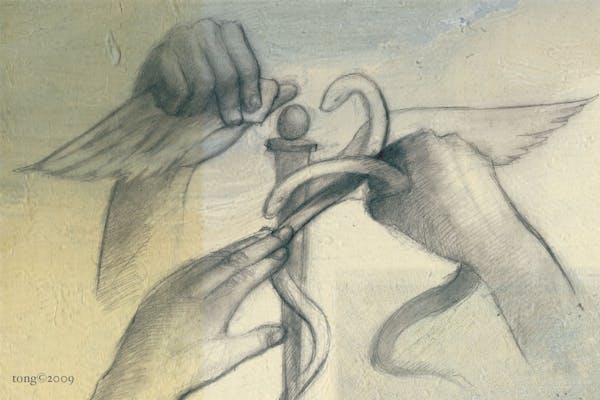Counterpoint
The state of Minnesota decides what benefits it covers and how much it will pay health plans to provide health care coverage for Minnesotans who are poor. Health plans must participate and must accept the rates -- it's the law.
The Star Tribune Editorial Board knows this. Yet in its Feb. 17 editorial ("Is state overpaying health plans?"), the newspaper chose to mislead readers. The question is fair to ask, but leaving out relevant information is irresponsible.
The facts:
The editorial focused on one program.The state groups three programs -- Medicaid, MinnesotaCare and the old General Assistance Medical Care -- into one contract. It's a package deal and must be scrutinized as such. Reviewing one product at the time skews the results.
The editorial focused on one year.But insurance financing is cyclical, containing highs and lows from year to year. The average profit over the past five years for all state public programs is 1.6 percent of revenue, less than the margins reported in the editorial for both Michigan and Wisconsin.
That 1.6 percent margin paints a different portrait than what the editorial led readers to believe by looking at one year. Reviewing finances one year at a time creates an incomplete picture.
All organizations-- nonprofit or for-profit, big or small -- must generate margin (or profit) and hold reserves.It's the responsible thing to do. Imagine how different the budget battles at the Legislature would have been the past few years if the state had held adequate reserves.
The editorial also misled readers when it glossed over critical differences in Minnesota's coverage compared with Medicaid in Wisconsin and Michigan. Comparing Medicaid programs is like comparing snowflakes. No two are alike.
Every state designs its own Medicaid program within the federal framework providing health care coverage to people who are poor. The differences in how and what benefits are covered and how much individuals must pay toward their care greatly influence the per person cost.
If the Star Tribune wants the state to pay Minnesota health plans what plans are paid in Wisconsin and Michigan, it needs to advocate for changes such as:
• Limits on home health care visits. Wisconsin allows 30 home health care visits per year. Minnesota allows 365.
• Limits on personal care attendant services. Wisconsin allows 50 visits per year, while Minnesota has no limit.
• Requiring enrollees to pay more for their care. To be more like Wisconsin, the Star Tribune will be asking Minnesota enrollees to help pay for outpatient surgery; dental care; dentures; ambulance services; nurse midwife services; visits with a psychologist; some lab and X-ray services; mental-health and substance-abuse services, and occupational, speech and physical therapy sessions.
• Requiring counties to provide more services. Wisconsin requires counties to provide many of the services that Minnesota covers through Medicaid health plans.
• Treating mental health and chemical dependency care differently than other medical care. In Michigan, inpatient hospital psychiatric services, outpatient psychiatric care, and many mental health, substance-abuse, and personal care or home help services are not covered by health plans.
• Reducing state-required benefits. Minnesota law requires Medicaid and private insurance to cover many benefits and services not required in Wisconsin or Michigan. Examples include treatment for Lyme disease, minimum stays for maternity care, hair prosthesis, reconstructive surgery, port-wine stain elimination, dieticians, opticians and more.
• • •
My organization, along with our member health plans, supports transparency. Taxpayers, businesses and individuals deserve to know how health care dollars are spent.
Full disclosure should be the standard for the media as well.
Personally, I have had great respect for the work of Star Tribune editorial writers. After last week's careless coverage of an issue I know well, I'm truly disappointed.
------------
Julie Brunner is the executive director of the Minnesota Council of Health Plans.
Ukraine aid vote is a domestic and geopolitical inflection point



